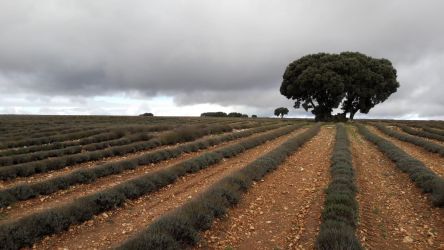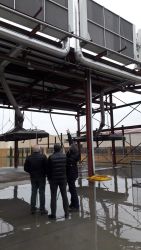The team from the University of Cordoba integrated in the Diverfarming project studies the commercialisation of lavender in Brihuega
The members of the UCO team working in the European Diverfarming project have travelled to Brihuega (Guadalajara, Spain) to know the value chain of the lavender and lavandin crops in a municipality which is the national leader in production of these crops.
 Following the meeting with Ángel Corral, in charge of the company INTERCOVA AROMÁTICAS and the visit to the lavender and lavandin fields and to the essential oils distillery, the professors from the University of Jaen integrated within the UCO team, Manuel Parras Rosa, Francisco José Torres Ruiz and Manuela Vega Zamora, concluded that the behaviour of lavandin made it ideal for introduction in the alleys of olive groves.
Following the meeting with Ángel Corral, in charge of the company INTERCOVA AROMÁTICAS and the visit to the lavender and lavandin fields and to the essential oils distillery, the professors from the University of Jaen integrated within the UCO team, Manuel Parras Rosa, Francisco José Torres Ruiz and Manuela Vega Zamora, concluded that the behaviour of lavandin made it ideal for introduction in the alleys of olive groves.
Lavandin is a hybrid form of two species of lavender, and has an intense aroma. Its compatibility with the lands that are home to the olive groves, its cost, planting framework, cost per crop, production per hectare and principal markets make it a profitable option to occupy the vacant olive grove alleys.
Diverfarming seeks the introduction of crop diversification and the use of low-input management practices in eight European countries, in order to improve the soil fertility, avoid erosion, increase the biodiversity and favour the anchoring of the young population in rural zones. In Andalusia, the University of Cordoba is experimenting in an olive grove located in Torredelcampo (Jaen) where the first diversification has already been carried out: saffron among the rows of olive trees.
The information gathered on this trip has established the choice of lavandin (in its two varieties of super and grosso) as being the most appropriate option to introduce into the experimental olive grove from next spring.
Diverfarming is a project financed by the Horizon 2020 Programme of the European Commission, within the challenge of “Food Security, Sustainable Agriculture and Forestry, Marine, Maritime and Inland Water Research and the Bioeconomy”, which counts on the participation of the Universities of Cartagena and Córdoba (Spain), Tuscia (Italy), Exeter and Portsmouth (United Kingdom), Wageningen (Netherlands), Trier (Germany), Pecs (Hungary) and ETH Zurich (Switzerland), the research centres Consiglio per la ricerca in agricoltura e l'analisi dell'economia agraria (Italy), the Consejo Superior de Investigaciones Científicas (Spain) and the Natural Resources Institute LUKE (Finland), the agrarian organisation ASAJA, and the companies Casalasco and Barilla (Italy), Arento, Disfrimur Logística and Industrias David (Spain), Nieuw Bromo Van Tilburg and Ekoboerdeij de Lingehof (Netherlands), Weingut Dr. Frey (Germany), Nedel-Market KFT and Gere (Hungary) and Paavolan Kotijuustola and Polven Juustola (Finland)).










